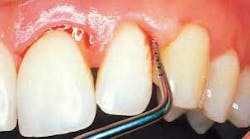Inflammatory markers and periodontal diseases
References
1. Cochran DL. Inflammation and bone loss in periodontal disease. J Periodontol 2008; 79(Suppl. 8):1569-1576.
2. Humphrey LL, Fu R, Buckley DI, Freeman M, Helfand M. Periodontal disease and coronary heart disease incidence: A systematic review and meta-analysis. J Gen Intern Med 2008; 23:2079-2086.
3. Novak MJ, Potter RM, Blodgett J, Ebersole JL. Periodontal disease in Hispanic Americans with type 2 diabetes. J Periodontol 2008; 79:629-636.
4. Morita I, Okamoto Y, Yoshii S, et al. Five-year incidence of periodontal disease is related to body mass index. J Dent Res 2011; 90:199-202.
5. Benguigui C, Bongard V, Ruidavets JB, et al. Metabolic syndrome, insulin resistance, and periodontitis: A cross-sectional study in a middle-aged French population. J Clin Periodontol 2010; 37:601-608.
6. Teles FR, Teles RP, Martin L, Socransky SS, and Haffajee AD. Relationships Among Interleukin-6, Tumor Necrosis Factor-a, Adipokines, Vitamin D, and Chronic Periodontitis. J Periodontol 2012; 83:1183-1191.
7. http://www.nhlbisupport.com/bmi/. Accessed September 12, 2012.
Maria Perno Goldie, RDH, MS
To read previous RDH eVillage FOCUS articles by Maria Perno Goldie, go to articles.




